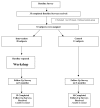A web-based Alcohol Clinical Training (ACT) curriculum: is in-person faculty development necessary to affect teaching?
- PMID: 18325102
- PMCID: PMC2329623
- DOI: 10.1186/1472-6920-8-11
A web-based Alcohol Clinical Training (ACT) curriculum: is in-person faculty development necessary to affect teaching?
Abstract
Background: Physicians receive little education about unhealthy alcohol use and as a result patients often do not receive efficacious interventions. The objective of this study is to evaluate whether a free web-based alcohol curriculum would be used by physician educators and whether in-person faculty development would increase its use, confidence in teaching and teaching itself.
Methods: Subjects were physician educators who applied to attend a workshop on the use of a web-based curriculum about alcohol screening and brief intervention and cross-cultural efficacy. All physicians were provided the curriculum web address. Intervention subjects attended a 3-hour workshop including demonstration of the website, modeling of teaching, and development of a plan for using the curriculum. All subjects completed a survey prior to and 3 months after the workshop.
Results: Of 20 intervention and 13 control subjects, 19 (95%) and 10 (77%), respectively, completed follow-up. Compared to controls, intervention subjects had greater increases in confidence in teaching alcohol screening, and in the frequency of two teaching practices - teaching about screening and eliciting patient health beliefs. Teaching confidence and teaching practices improved significantly in 9 of 10 comparisons for intervention, and in 0 comparisons for control subjects. At follow-up 79% of intervention but only 50% of control subjects reported using any part of the curriculum (p = 0.20).
Conclusion: In-person training for physician educators on the use of a web-based alcohol curriculum can increase teaching confidence and practices. Although the web is frequently used for dissemination, in-person training may be preferable to effect widespread teaching of clinical skills like alcohol screening and brief intervention.
Similar articles
-
Effects of screening and brief intervention training on resident and faculty alcohol intervention behaviours: a pre- post-intervention assessment.BMC Fam Pract. 2005 Nov 4;6:46. doi: 10.1186/1471-2296-6-46. BMC Fam Pract. 2005. PMID: 16271146 Free PMC article.
-
Effect of a teaching skills program on faculty skills and confidence.Ambul Pediatr. 2004 Jan-Feb;4(1 Suppl):117-20. doi: 10.1367/1539-4409(2004)004<0117:eoatsp>2.0.co;2. Ambul Pediatr. 2004. PMID: 14731081
-
Faculty Communication Knowledge, Attitudes, and Skills Around Chronic Non-Malignant Pain Improve with Online Training.Pain Med. 2016 Nov;17(11):1985-1992. doi: 10.1093/pm/pnw029. Epub 2016 Apr 1. Pain Med. 2016. PMID: 27036413
-
Meeting the computer technology needs of community faculty: building new models for faculty development.Ambul Pediatr. 2004 Jan-Feb;4(1 Suppl):113-6. doi: 10.1367/1539-4409(2004)004<0113:mtctno>2.0.co;2. Ambul Pediatr. 2004. PMID: 14731082 Review.
-
Microteaching and standardized students support faculty development for clinical teaching.Acad Med. 2002 Sep;77(9):941. doi: 10.1097/00001888-200209000-00048. Acad Med. 2002. PMID: 12228115 Review.
Cited by
-
Promoting substance use education among generalist physicians: an evaluation of the Chief Resident Immersion Training (CRIT) program.J Gen Intern Med. 2009 Jan;24(1):40-7. doi: 10.1007/s11606-008-0819-2. Epub 2008 Oct 21. J Gen Intern Med. 2009. PMID: 18937015 Free PMC article.
-
Internet-Based Learning for Professionals in Addiction Psychiatry: A Scoping Review.Indian J Psychol Med. 2022 Jul;44(4):325-331. doi: 10.1177/02537176221082897. Epub 2022 May 8. Indian J Psychol Med. 2022. PMID: 35949641 Free PMC article.
-
HIV primary care providers--Screening, knowledge, attitudes and behaviors related to alcohol interventions.Drug Alcohol Depend. 2016 Apr 1;161:59-66. doi: 10.1016/j.drugalcdep.2016.01.015. Epub 2016 Jan 29. Drug Alcohol Depend. 2016. PMID: 26857898 Free PMC article.
-
Internal medicine residency training for unhealthy alcohol and other drug use: recommendations for curriculum design.BMC Med Educ. 2010 Mar 15;10:22. doi: 10.1186/1472-6920-10-22. BMC Med Educ. 2010. PMID: 20230607 Free PMC article.
References
-
- United States Preventive Services Task Force and Screening and behavioral counseling interventions in primary care to reduce alcohol misuse. Recommendation Statement http://www.ahrq.gov/clinic/3rduspstf/alcohol/alcomisrs.htm - PubMed
-
- United States Preventive Services Task Force . Guide to Clinical Preventive Services. 2. Washington, DC: Office of Disease Prevention and Health Promotion; 1996.
-
- Anderson P, Gual A, Colom J. Alcohol and Primary Health Care: Clinical Guidelines on Identification and Brief Interventions. Barcelona, Spain, Department of Health of the Government of Catalonia; 2005.
Publication types
MeSH terms
Grants and funding
LinkOut - more resources
Full Text Sources
Medical


